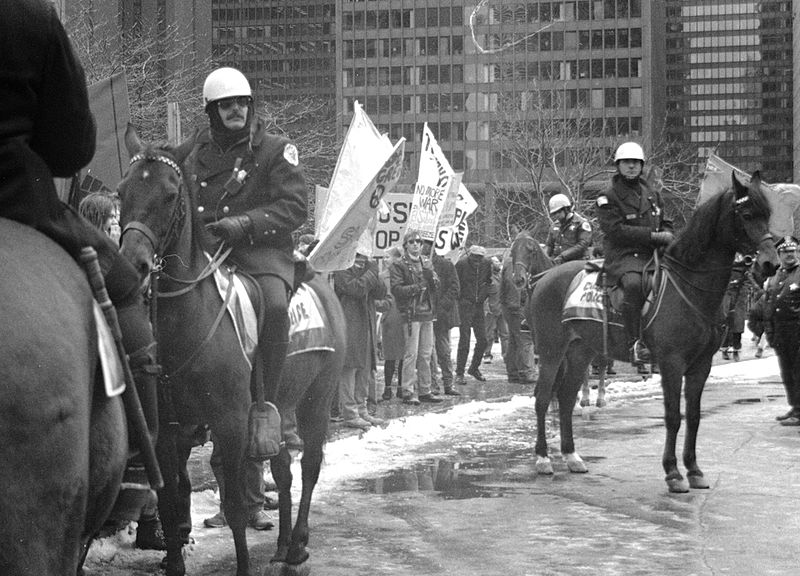What are the lessons from the Salvadoran civil war for Iraq?
Published in Newsday.
What might have ended as an odd remark by Dick Cheney in the vice presidential debate has instead become a pattern. Conservatives have repeatedly cited the Central American nation of El Salvador as a model for building democracy in Iraq and Afghanistan.
Wracked by civil war in the 1980s, El Salvador has since made the transition to a stable democracy. Yet, the warped lessons that Bush administration hawks draw from the Reagan-era intervention in this country suggest a willful blindness to even the most murderous consequences of the United States’ Cold War foreign policy. They give us reason to look critically again at the actions the White House is taking under the guise of promoting freedom.
During a mid-November visit to El Salvador, the only Latin American nation that currently has troops in the U.S. “coalition of the willing,” Defense Secretary Donald Rumsfeld praised the country’s conservative government. He said El Salvador “understands well the human struggle for liberty and democracy.”
In drawing a parallel to Iraq, the secretary echoed the comments of Cheney in his Oct. 5 debate with John Edwards. The vice president argued that in 1980s El Salvador “a guerilla insurgency controlled roughly a third of the country, 75,000 people dead. And we held free elections. I was there as an observer on behalf of the Congress. … And as the terrorists would come in and shoot up polling places as soon as they left, the voters would come back and get in line and would not be denied their right to vote. And today El Salvador is … a lot better because we held free elections.”
There is a serious problem with this story. The 75,000 people Cheney mentioned were indeed killed by terrorists, but not by the rebel FMLN forces that he intended to condemn. Rather, they were under assault from the very Salvadoran government that the Reagan administration was supporting and from its paramilitary death squads. With a list of opposition politicians having already been executed or exiled, the 1984 elections were little more than a farce designed to give democratic respectability to a regime that was perpetuating some of the worst human rights abuses in the hemisphere.
Before peace accords ended the civil war in 1992, the United States would provide the bloody-handed Salvadoran government more than $6 billion in aid.
The facts of Salvadoran history were definitively established by a UN-sponsored truth commission in 1993. It concluded that 85 percent of the atrocities in the conflict were committed by the army and its surrogates, with the rebels responsible for 5 percent and the remaining 10 percent undetermined.
“The army, security forces, and death squads linked to them committed massacres, sometimes of hundreds of people at a time,” the truth commission reported. Among the crimes that the Reagan administration had attempted to obscure or deny were the 1989 murder of six Jesuit priests, the slaughter of hundreds of villagers and the assassination of Archbishop Oscar Romero.
Even if U.S. involvement in the country did not present a damning cautionary tale, it is uncertain what lessons the current administration would like to draw from the conflict for the present. While El Salvador experienced a conventional civil war with clearly defined adversaries, the invasion of Iraq has created a broad and varied resistance. It has placed U.S. soldiers in a type of guerrilla war that even many counter-insurgency experts consider impossible to win.
Of course, “winning” on President George W. Bush’s terms may not be desirable at all, especially if it means using Iraq as a long-term base from which to project military power. In El Salvador, it was only after the Cold War ended and the United States relented on its anti-Communist obsession that the UN and other international mediators were able to help facilitate a transition to democracy – something the FMLN had long desired, and that the Iraqi people may long be denied.
El Salvador’s current democracy is not perfect, and U.S. interventions in the latest elections – thinly veiled threats that votes for the FMLN, now the leading opposition party, would lead to reprisals from the White House – have hardly helped. But the years since U.S. military support was curtailed have certainly seen an improvement. The clearest lessons from the El Salvador model are that the White House is all too capable of perpetuating crimes in the name of liberty. And that U.S. withdrawal can sometimes be of greatest service to freedom.
__________
Research assistance for this article provided by Jason Rowe. Photo credit: Linda Hess Miller / Wikimedia Commons.
